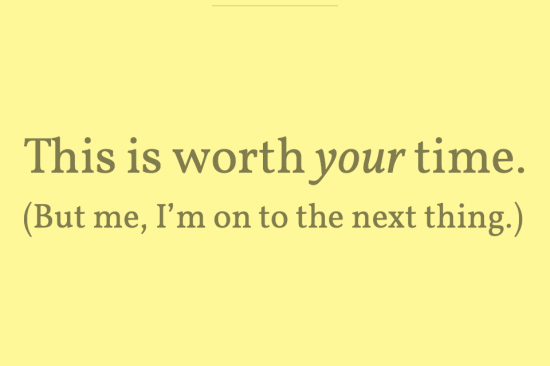But are not bloggers journalists?
“Journalism is dead,” he tweeted.
— Kevin Nguyen (@knguyen) October 3, 2014
But are not bloggers journalists?
“Journalism is dead,” he tweeted.
— Kevin Nguyen (@knguyen) October 3, 2014
After six years with various iPhones, I lasted all of five days trying out my first Android smartphone. But I’m not mad about the $50 restocking fee I had to give the AT&T store to give the Galaxy S5 back. It was a worthy experiment that made me realize what I do like about iOS and what I want out of a phone in general, plus helped me break some less than stellar habits. Here’s what I learned.
1) I want my text messages pushed to me.
I’m not a big fan of push notifications — I have pretty much all of them turned off — but I rely on push for accessing texts quickly and easily. It’s something that defines the medium (for me, but obviously not for everyone). I used to get miffed/mystified when my Android-using husband didn’t get my texts right away, but now I know why. Continue reading iPhone 5s vs Galaxy S5: Why I Lasted 5 Days on Android (and You Should Too)
If someone dies and you want to tweet about it, go for it. You’re doing them a favor.
Last week, New York Observer editor Peter Kaplan died. I didn’t know him, I didn’t even know of him, by name. But I felt like I should’ve.
While I was sad to hear of a brilliant man’s relatively early death (he was 59), I was grateful for the flood of tweets memorializing him. Peter Kaplan was a person worth remembering, but also a person worth discovering.
These days, even minor celebrities’ fame explodes when they die. Instead of dismissing the surge as a symptom of pop-culture obsession, consider it an opportunity to learn about one more human and extend whatever impression they made on the world just a little bit further. Continue reading It’s Alright to Die
It’s easy to buy Twitter followers — you can get them for as little as a penny each. We have friends who’ve done it. For brands, it can make a big difference in perceived credibility. But if you’re going to do it, don’t make it obvious.
We came across an account today (set up by someone we have met) that shows what it looks like when you pay to look cool, but end up coming off as a fool.
It’s clearly a new account. And yet it has a whopping 2,333 followers while following only 10 others. Unless you’re a movie star, pop star, sports star or robot rover on another planet, that’s a highly unlikely ratio for a just-started account to have. Continue reading What Buying Twitter Followers Looks Like
What does it mean to like or favorite something on the internet today?
The above is a riff on a line from Robin Sloan’s recent coup d’app, Fish. His tap essay explores the difference between liking something online and actually loving something online. Robin posits that in the overwhelming stream of great posts, articles, pics and videos, something we love on the internet is something come back to, something we read or visit at least twice. Fish is a beautiful essay with a strong point; it’s innovative, well-designed and touching, and I am a big fan.
However, I don’t quite agree with the disparagement of liking, faving (and even +1-ing) that helps form the essay’s underlying thesis. According to Sloan, when you deign to spend a click on one of these actions, (emphasis his):
“You’re saying to your friends or followers: This is worth your time. (But me, I’m on to the next thing.)”
 Continue reading In Defense of Likes and Faves: Doodling in the Margins
Continue reading In Defense of Likes and Faves: Doodling in the Margins